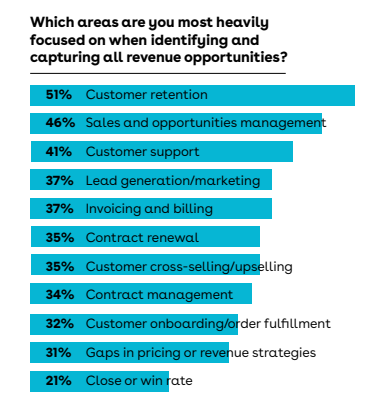March 18, 2025
Report: The AI clock is ticking, two years for revenue boosts, or else!

The huge number of AI features for business software and services puts pressure on executives and managers to deliver results, now. Insights from Conga’s latest research report shows executives could benefit most from AI and automation, but those who don’t adopt, or whose organisations are not adept at using AI will suffer.
The “The Revenue Imperative” report finds that 97% of leaders are under pressure to maximise revenue within two years or face bottom-line consequences. Potentially, those leaders could be replaced by more aggressive operators, or in-part by AI systems as they get smarter.
The survey of over 600 UK and US leadership decision-makers, sees total agreement that understanding the entire revenue lifecycle – from initial proposal or quote to customer sale to ongoing customer expansion and renewal – is important.
Yet, 46% of professionals surveyed lack confidence in their organisation’s ability to identify and capture all possible revenue opportunities. Among the biggest consequences of mismanaging revenue processes are major financial setbacks like higher operational costs (50%), missed revenue opportunities (43%), and revenue leakage (35%). Because revenue management and understanding the customer directly impact profitability, sustainability, and long-term growth, effective revenue management is critical to creating a sound business.
The value of AI is widely recognised
Some 87% of professionals surveyed are confident in the reliability of AI to improve business performance, but just one in four are using AI to drive business process effectiveness for areas like revenue management. Around 66% have yet to adopt AI report a high likelihood of adoption in the coming year.
Among the other insights from the survey, the main focus is on customer retention (51%), customer support (41%) as part of the customer revenue lifecycle. And almost a third (32%) see decreased customer satisfaction and retention as a consequence of mismanaging revenue processes.
High-performing teams with the most confidence in their ability to manage and capture revenue see AI tooling as a potentially valuable asset in their revenue growth journeys, while best-in-class organisations are significantly more likely (48%) to prioritise AI tool adoption (34% of others).
The “good-enough” aspect risk
What the report, and the tech analysts rarely ask is, how many businesses feel satisfied with their tech and AI footprint? How many have the tools to do their business adequately, and don’t want to keep running along the endless upgrade/training treadmill? These companies are likely at risk as other businesses grow and look to expand, acquire or eliminate competition.
A degree of confidence, fear and doubt must linger in these businesses as they consider a future dominated by AI, a technology that still feels remote or distant. Will their customers look elsewhere, or are they too happy with what they have with incumbent companies? As poor, costly, customer experiences become more pronounced, this will become an issue for all companies.




